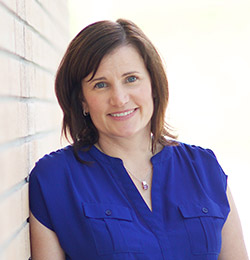UBCO's drop-in mental health clinic so successful it's here to stay
What began as a five-week pilot project to gauge demand for no-barrier mental health services has evolved into a permanent walk-in-wellness clinic on UBC's Okanagan campus.
"This is a game changer," says Lesley Lutes, associate professor and director of clinical training for the PhD program in clinical psychology at UBC Okanagan. "This is a space where community members can drop in for free mental health services without an appointment or referral. It's changing the way people are accessing care for their mental health."
This is the first public walk-in mental health clinic on a university campus in British Columbia. Its purpose is two-fold-the clinic is providing support to community members in distress, and at the same time students are being trained for the future of health care delivery.

Lesley Lutes, clinical health psychologist and director of the PhD program in clinical psychology at UBC's Okanagan campus.
In the five-week unfunded pilot last fall, Lutes' team accommodated more than 50 drop-in sessions, helping patients who were experiencing various issues including stress, depression, anxiety, serious mental illness and suicide risk.
"This clinic is for the community," says Lutes. "People begin to experience symptoms and don't know where to go because there is no primary care for mental health. They often don't seek help until they're in crisis, and end up in an emergency room where they're more likely to get medication only, rather than treatments involving therapy."
In the past decade, emergency room admissions related to mental health have increased 300 per cent, and in 60 per cent of primary care visits, patients report a mental issue. This is why UBCO's walk-in-wellness clinic is the first step in Lutes' ultimate goal of introducing psychologists into primary care.
It's called integrated primary care, and at Lutes' former institution in North Carolina, it is now the standard of practice. In this model, medical doctors and psychologists work side-by-side. When a patient says they're struggling emotionally, or having difficulty managing a chronic condition, a psychologist enters the room for a brief 30-minute consultation and suggests a targeted intervention based on the needs of the patient. Medication options are also discussed during this time.
Lutes is clear, however, this does not fully replace speciality mental health services. Integrated primary care is meant to be a front-line service that can help some people get what they need at one appointment-without having to be referred to another professional.
"It's same day service. Doctor's love it, psychologists love it, and patients love it as it medicalizes mental health, which reduces the stigma. So why not do it?" says Lutes. "We're decreasing mental health burden, sick days, disability claims, suicide risk-you name it. It's also more cost-effective for government."
The provincial government is currently rolling out new primary care networks across BC that aim to achieve integrated care. However, they have not included psychologists in their plans. In addition to being a part of these networks, Lutes' believes that to make an immediate impact the government does not need to spend a dime on new buildings or centres.
"We already have thousands of primary-care offices around the province that could house a psychologist tomorrow," she says.
Lutes will be testing the first integrated primary care clinic on the UBC Okanagan campus this fall. In the meantime, she hopes the community will embrace and utilize the permanent walk-in-wellness clinic.
"We're here to help. We created this clinic because we know that life is stressful for everyone at times. We want people to know that there is an excellent evidence-based resource available to them free of charge," says Lutes. "If you haven't struggled with anxiety, depression, loss, divorce, substance use or binge eating, odds are someone you care about has. Life is life and it affects us both physically and emotionally-and Okanagan residents deserve healthcare that treats their whole self."
The walk-in-wellness clinic is open Thursdays from 10 a.m. to 3 p.m. and is located in the Interprofessional Clinic, ASC 141, Arts and Sciences Centre, 3187 University Way






